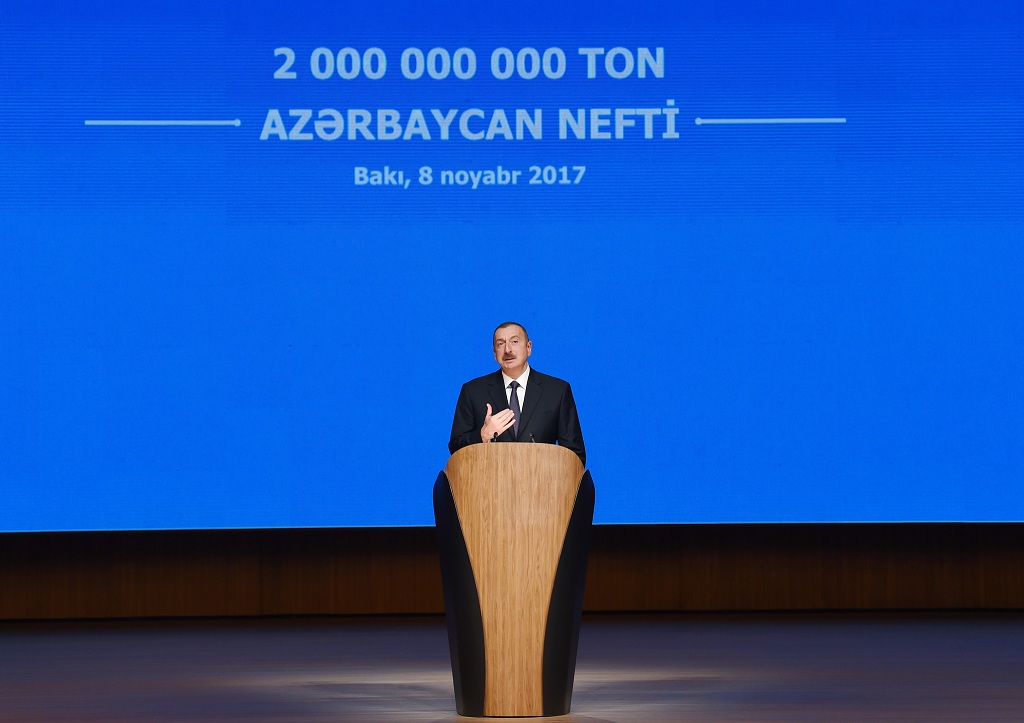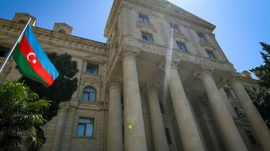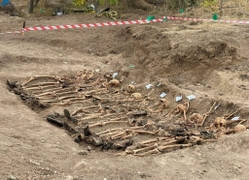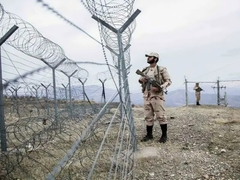When most people think of oil production, they picture Saudi Arabia, Russia or Texas. But no country has ever been so closely associated with oil than Azerbaijan and its capital city Baku – the birthplace of oil production and powerhouse of technological innovations.
On November 8, Azerbaijan marked the production of the two billionth ton of oil since it began production in the 19th century, with an event held at the Heydar Aliyev Center in Baku.
Crediting the country's oil and gas industry as a pillar of growth for the modern state of Azerbaijan since it gained independence from the Soviet Union in 1991, Azerbaijan’s President Ilham Aliyev highlighted the role the oil and gas industry has played in shaping all aspects of life in the country.
“Out of two billion tons of oil produced in the country, 700 million tons were extracted in the years since we gained independence, including the 460 million tons produced by the BP-led consortium,” Aliyev said at the event, referring to BP and its interests with Azerbaijan’s state oil company SOCAR.
“Azerbaijan will continue developing the oil industry that serves as a guarantee for the country's economic and political independence,” Aliyev said.
Azerbaijan’s achievements and milestones in the oil industry include pioneering mechanical drilling, being home to the first offshore platform, and having constructed the first oil pipeline and steam-powered tankers. Just a mention of the surname “Nobel” has most people thinking of prestigious prizes, awarded in Scandinavian countries. Yet the renowned Swedish Nobel brothers are synonymous with Baku oil from which the brothers earned enormous sums of money and later formed the foundation of the Nobel Prize fund.
Azerbaijan’s oil industry went through several stages of development. Mechanical drilling began in 1846 and continued up until 1920, when the industry was nationalized. Oil production went from 2.4 million tons in 1921 to 23.6 million tons in 1941, comprising 76 percent of the total volume of production of the USSR.
The oil extracted in Azerbaijan and processed in the refineries in the capital Baku has played a crucial role in the defeating the Nazi forces by the Soviet Union. Throughout the World War II, Baku supplied the entire Soviet army with fuel, meeting up to 90 percents of its needs.
By the middle of the 20th century, offshore rigs were constructed and producing oil from beneath the Caspian Sea. The commissioning of the Neft Dashlari (“oily rock”) field in 1950 marked the third stage of development, as extraction went offshore. Lasting until 1969, the third phase is credited with expanding the potential of and discovering oil and gas fields at Qum-Daniz, Sangachal-Divanni-Daniz-Khara-Zira island, Bulla-Deniz, Darwin were discovered and commissioned.
A fourth phase began in 1969, and saw rapid development of the oil and gas industry under the rule of Heydar Aliyev, then-Head of the Soviet Azerbaijan. The elder Aliyev marked the extraction of the first billion tons of oil in 1971, and is credited with having made contributions to the overall development of Azerbaijan due to oil industry developments throughout the 1970s and 1980s.
At that time, the increase in oil production, the commissioning of new facilities, the construction of a deep-water plant in Azerbaijan, and the reconstruction of an oil refinery significantly strengthened the country’s potential.
The fifth phase of industry development began after the collapse of the USSR, in 1991, which enabled an independent Azerbaijan to pursue its own development strategy.
Since independence, BP has been an historical ally of the Azerbaijani oil industry.
“[BP] plays a very active role in our major projects. So, our public should know that foreign partners, especially BP, played a great role in the development of Azerbaijan, in strengthening its economic strength,” Aliyev said at last week’s event.
Addressing the event, BP regional president for Azerbaijan, Georgia and Turkey Gary Jones also hailed fruitful cooperation with Azerbaijan.
“Today, we celebrate a momentous milestone – Azerbaijan’s oil production has just stepped over two billion tons. Two billion tons!”, said BP’s Regional President for Azerbaijan, Georgia and Turkey, Gary Jones, at the event. “For some, it’s just a number, albeit impressive. For others, it’s a whole page in the nation’s history. For me, it’s a fascinating story,” Jones said.
BP is currently heading a multinational consortium operating at the Azeri-Chirag-Guneshli offshore oil field, located about 100 km (62 mi) east of Baku. In September, BP signed a contract that prolongs its 1994 sharing agreement with Azerbaijan’s SOCAR for Azerbaijan's largest oil fields until 2050.
Azerbaijan’s proved and forecasted oil reserves are estimated at around 1.5 billion and 2 billion tons, respectively. The country is also home to 2.6 trillion cubic meters (tcm) of proved gas reserves, while forecasted reserves are said to be as large as three or four tcm.







 U.S. Secretary of State Antony Blinken reiterated Washington’s unwavering support for the ongoing peace process between Azerbaijan and Armenia in a...
U.S. Secretary of State Antony Blinken reiterated Washington’s unwavering support for the ongoing peace process between Azerbaijan and Armenia in a...
 The Iranian and Cuban transport ministers have discussed expanding maritime and air transportation cooperation.
The Iranian and Cuban transport ministers have discussed expanding maritime and air transportation cooperation.
 Kyrgyzstan has joined the extensive reconstruction efforts in the Karabakh region of Azerbaijan, after a series of mega initiatives were launched b...
Kyrgyzstan has joined the extensive reconstruction efforts in the Karabakh region of Azerbaijan, after a series of mega initiatives were launched b...
 Iran is moving to fortify its eastern border with Afghanistan in a bid to fight illegal migration and drug trafficking, along with enhancing security.
Iran is moving to fortify its eastern border with Afghanistan in a bid to fight illegal migration and drug trafficking, along with enhancing security.



